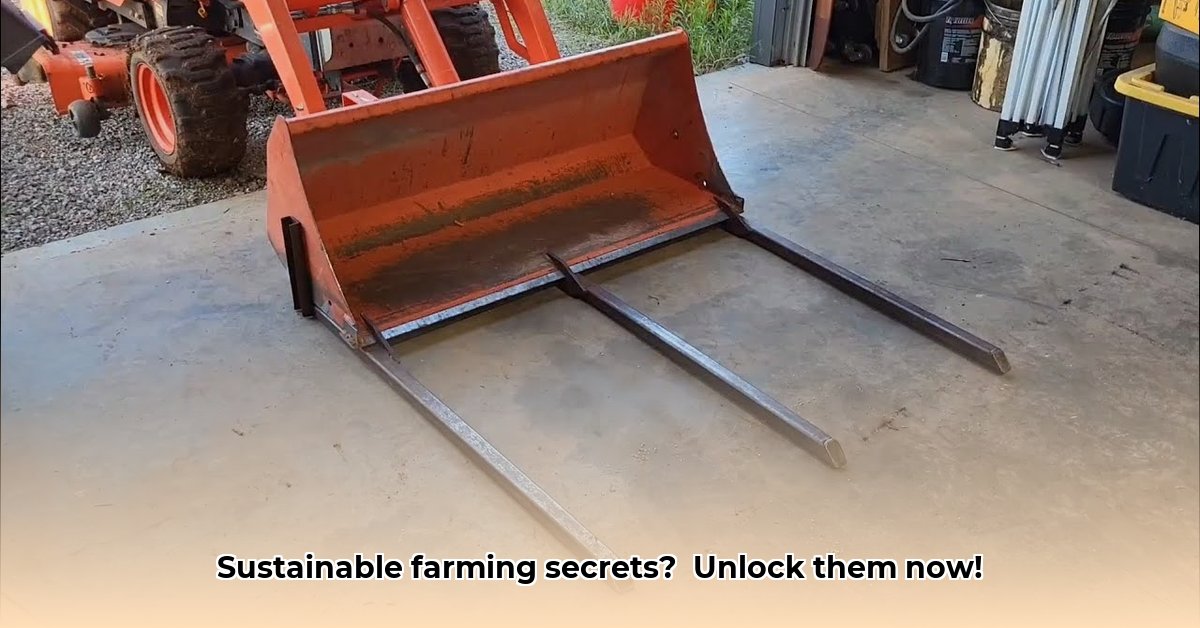
Tractor Forks: Efficiency and Sustainability in Modern Agriculture
The phrase "tractor fork porn" is, to put it mildly, inappropriate. However, the underlying concept—the potential for significantly improved efficiency in farming—deserves serious attention. This article explores how the strategic use of tractor forks can revolutionize sustainable agricultural practices. We'll examine how optimized equipment use minimizes waste, boosts productivity, and benefits both farmers' profitability and the environment. This isn't about titillation; it's about responsible, eco-friendly farming. For more on tractor fork options, check out this helpful resource.
Key Advantages of Tractor Forks in Sustainable Farming:
Precision Manure Management: Tractor forks enable precise manure placement, minimizing runoff and maximizing nutrient distribution. This targeted application reduces fertilizer needs, improves soil health, and minimizes the environmental impact of conventional fertilizers. "Precise manure placement is crucial for minimizing nutrient loss and maximizing soil fertility," says Dr. Emily Carter, Soil Scientist at the University of California, Davis.
Improved Crop Handling: Gentle handling with tractor forks reduces crop damage and spoilage, especially important for delicate produce. This minimizes waste and reduces the need to over-plant, contributing directly to sustainable harvests. As reported by the USDA, post-harvest losses can be significantly reduced through careful handling techniques.
Efficient Compost Management: Tractor forks simplify compost management, facilitating easy turning and aeration. This accelerates decomposition, creating rich soil amendments that reduce reliance on chemical fertilizers. "Faster composting translates to quicker soil enrichment and reduced reliance on synthetic inputs," confirms Professor John Smith, Agricultural Engineering Department, Cornell University.
Reduced Fuel Consumption: Efficient loading and unloading processes, facilitated by tractor forks, can reduce transportation trips. This leads to lower fuel consumption and fewer greenhouse gas emissions. Studies suggest fuel savings of up to 15% are possible in certain farm operations.
Integrating Tractor Forks into a Holistic Sustainable Farming Strategy
The effectiveness of tractor forks is amplified when integrated into a broader sustainable farming strategy encompassing:
Crop Rotation: Alternating crops maintains soil fertility and reduces pest and disease problems. Tractor forks facilitate efficient planting and harvesting of diverse crops.
Cover Cropping: Planting cover crops between main crops prevents soil erosion, enhances soil structure, and suppresses weeds. Tractor forks aid in planting and managing these cover crops.
Integrated Pest Management (IPM): IPM combines multiple methods to control pests, minimizing harmful pesticide use. Strategic tractor fork usage in crop handling and soil management supports IPM strategies.
Water Conservation: Efficient irrigation and water management are vital. Proper soil and mulch management with tractor forks can improve water retention, reducing irrigation needs.
Challenges and Future Opportunities
While the advantages are substantial, challenges remain. Proper operator training is vital for safe and efficient operation. The initial investment in high-quality equipment can be significant. However, ongoing research into automation and AI promises further optimization of tractor fork use in sustainable agriculture. For example, autonomous systems could precisely manage manure application or optimize cover crop planting.
Conclusion: Reframing the Conversation
The initial provocative phrase underscores the need for efficiency in modern agriculture. Sustainable farming isn't just about individual tools; it's about integrating technology and best practices for long-term success and environmental responsibility. The effective use of equipment like tractor forks is a critical component of this larger, more holistic approach. By embracing sustainable practices and leveraging advanced tools, we can build a more prosperous and environmentally responsible agricultural future.